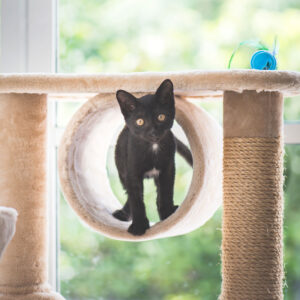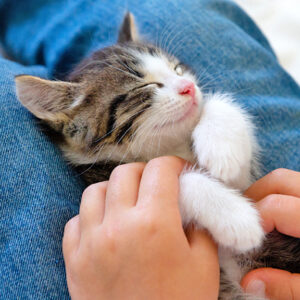
A Mountain of Veterinary Conversation with Dr. Jeff Young, Founder of Planned Pethood and star of Dr. Jeff: Rocky Mountain Vet
March 21, 2023
The Animated, Illustrated Cat with Marlene Sharp, TV and Film Writer and Executive and Proprietor of Pink Poodle Productions
March 28, 2023
Contributed by Allison Hunter-Frederick, Certified Cat Behavior Consultant & Trainer
Are you thinking about adopting a new kitten? My husband and I have raised a kitten of our own and fostered almost 40. This article will cover the basics of how to prepare your home for a new kitten and how to help your kitten settle into your home. I’ll also briefly address how to curb unwanted behaviors and how to socialize your kitten.
 You should first prepare your home ahead of time. Your kitten will need a food bowl, water bowl, litter box, scratching post, soft bed, cat brush, and toys. It is critical that you use non-clumping litter until your kitten matures; some kittens will eat litter and clumping litter can clump in their intestines and cause very serious health problems and even death.
You should first prepare your home ahead of time. Your kitten will need a food bowl, water bowl, litter box, scratching post, soft bed, cat brush, and toys. It is critical that you use non-clumping litter until your kitten matures; some kittens will eat litter and clumping litter can clump in their intestines and cause very serious health problems and even death.
If possible, bring your kitten home when you have a few quiet days to spend with him. Try to bring him home in the morning, so that he’ll have time to acclimate to your home before bedtime. Also, collect the scent from your kitten’s current environment to ease the transition. Rub an unscented cloth on his siblings, his bed, and other surfaces that he’s touched. Put this cloth in his kennel and then in your home.
Make the car ride home safe and pleasant. Either fasten the cat carrier in the back seat with a seat belt or place the carrier on the floor behind the passenger seat to keep the carrier secure. Spray cat pheromones on the carrier and drape a blanket over it. Play quiet music or speak soothingly to your kitten on the drive, and keep the drive gentle.
When you arrive home, place your kitten and her carrier in a small, quiet room away from noise and commotion. Then open the carrier door and allow her to explore her new surroundings. Keep the room door closed initially so your kitten can first become familiar with one room; this will overwhelm her less than if you allow her immediate access to your entire house.
On a similar note, allow your kitten to dictate interactions for the first few days. If he comes up to you and rubs into you, go ahead and pet him. Otherwise, realize that he might be scared and uncertain of what to expect. He may feel more comfortable hiding in his carrier or elsewhere in the room than interacting with you.
 Initially, stick to the same diet and feeding routine that your kitten is used to. The stress of moving to a new home may cause your kitten to not eat much at first, and sudden changes in a cat’s diet can cause digestive upsets. Once your kitten has settled into your home you can transition him to new foods and new feeding times. Remember that after weaning, kittens lose the ability to digest the sugar in cow’s milk and so it can give them diarrhea. Also, if you feed kittens people food they could turn into beggars. If you have any concerns about your kitten’s eating habits, contact your vet.
Initially, stick to the same diet and feeding routine that your kitten is used to. The stress of moving to a new home may cause your kitten to not eat much at first, and sudden changes in a cat’s diet can cause digestive upsets. Once your kitten has settled into your home you can transition him to new foods and new feeding times. Remember that after weaning, kittens lose the ability to digest the sugar in cow’s milk and so it can give them diarrhea. Also, if you feed kittens people food they could turn into beggars. If you have any concerns about your kitten’s eating habits, contact your vet.
After a few weeks, your kitten should start to feel more comfortable in your home. At this point, she may start to test boundaries, so it’s important to teach good manners early on. If she begins to swat or bite, say “OW!” and then cease all interactions until she stops. Play sessions at different times throughout the day should help her release her energy in an appropriate way. To prevent the destruction of furniture, provide her with a scratching post and chew toys and sticks. The scratching post should be tall enough for your cat to stretch to her full body length when using it. If there is furniture you don’t want your kitten on, use treats to entice her to acceptable places. Also, provide her with acceptable climbing alternatives. You should also keep your counters food-free, so you don’t teach her that countertops can be a great source of snacks.
 Along with instilling good manners, it’s also important for you to begin socializing your kitten. When kittens are 8 to 16 weeks old their personalities are shaped and they are most open to new experiences. Proper socialization during this time will start your kitten out on the right paw and give it skills that will last a lifetime. To do this, expose him to as many people, animals, places, sensory stimuli, and handling as possible in a positive way. The key word here is positive; otherwise, a new experience might end up scaring your kitten and cause him to develop an aversion to it. Exposing your kitten in a positive way involves using reinforcers that he likes, whether it be treats, toys, or attention. It also involves watching his body language to gauge how he feels and continuing with an experience only if your kitten is acting comfortable with it. Exposure to things that are likely to be scary initially should be done very slowly.
Along with instilling good manners, it’s also important for you to begin socializing your kitten. When kittens are 8 to 16 weeks old their personalities are shaped and they are most open to new experiences. Proper socialization during this time will start your kitten out on the right paw and give it skills that will last a lifetime. To do this, expose him to as many people, animals, places, sensory stimuli, and handling as possible in a positive way. The key word here is positive; otherwise, a new experience might end up scaring your kitten and cause him to develop an aversion to it. Exposing your kitten in a positive way involves using reinforcers that he likes, whether it be treats, toys, or attention. It also involves watching his body language to gauge how he feels and continuing with an experience only if your kitten is acting comfortable with it. Exposure to things that are likely to be scary initially should be done very slowly.
Although kittens can be tiring and challenging, they also bring fun and joy to our lives. May you enjoy your new adventure! Feel free to email me if you have questions.
About Allison Hunter-Frederick
Allison Hunter-Frederick is a certified cat behavior consultant and trainer. She is also a mother of three furkids and several revolving foster cats, a host mom to an international student, and the wife of a supportive husband. Allison is a member of the International Association of Animal Behavior Consultants, Pet Professional Guild (including the PPG Cat Committee), and Best Friends Network Partners. Currently, she volunteers with The Capital Humane Society, The Cat House, Lincoln Animal Ambassadors, and Love on a Leash.




